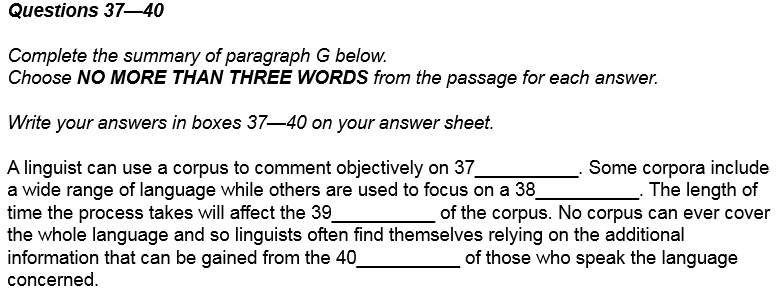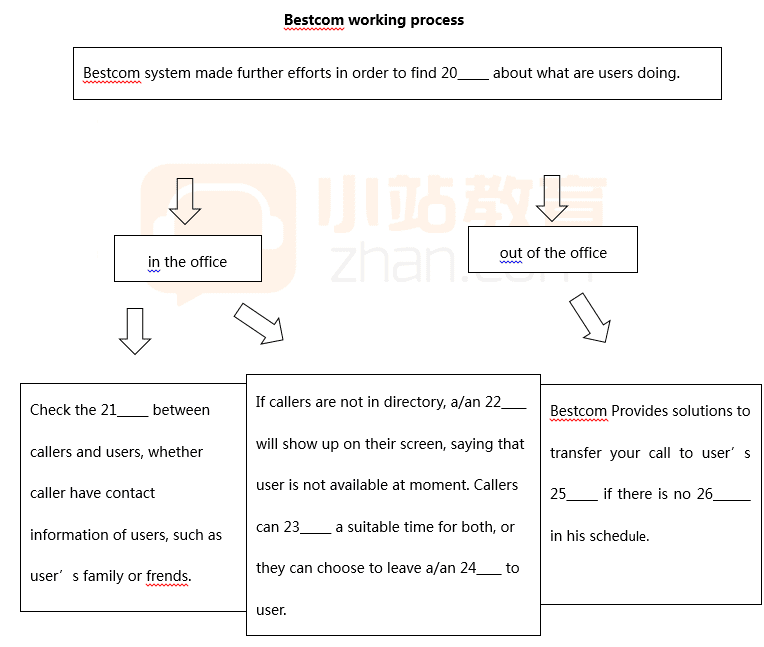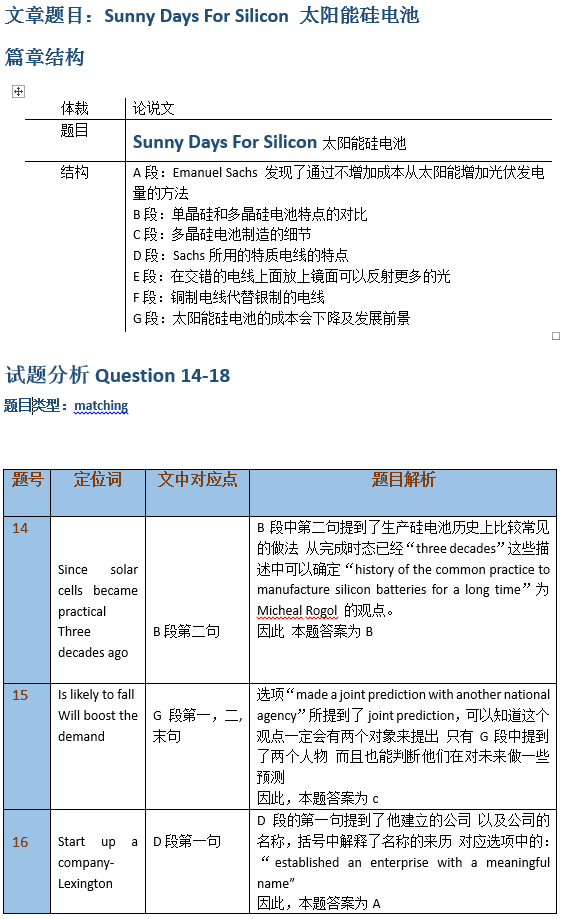如何提高阅读的分数?一起来学习一下吧,下面小编就和大家分享,来欣赏一下吧。
雅思阅读上分技巧:这2大阅读技巧很重要
1. 你读对了吗?
阅读提分的关键涉及2方面的内容——读和理解。只有读完文章,才能知道文章的内容和主题;只有读完题目才能知道,考官想要定位的是文章中的哪些关键信息。所以会读是首要的,想要提分你得这么有技巧的读:
略读粗略阅读文章的“面式”读法,可以帮助考生快速获取阅读材料的主要内容和大意。快速阅读时,建议烤鸭通过略读文章标题来判断、预测主要内容,与此同时还可以通过略读首尾段、每段的首尾句了解文章大意。跳读、组读跳读是带着明确目标,寻找“特定信息”的阅读方法,是一种忽略无关内容的“点式”阅读。这种方法特别适用于细节检索式问题。组读是以意群为单位,一组一组地“视读”,考生需要边读边理解。在此期间,学生必须减少眼停次数,缩短“眼脑直映”的时间。这里要说明一下,“组读”技巧需要学生有较强的英语阅读能力和理解能力,需要在平时多加训练,才能达到准确无误。记忆除了以上三种阅读方法,阅读文章时,熟记文中的重要情节也是提高阅读速度的重要手段。边读边忘导致考生无法深入、全面地理解材料,回视、重读等不良阅读习惯也会随之出现。因此,建议烤鸭们,平时可以通过背诵重点句型、段落主题句、课文主要段落、结论,或在规定的时间内阅读一段文章,然后复述该段文章的主要内容等方法锻炼自己的“记忆能力”。
2. 快才是王道
不同于一般平时的阅读,雅思阅读要求的是一个快字!不要总是考虑面面俱到,希望把每句都读懂,首先是时间不允许,其次由于单词量的限制即便每句都读也不一定能全部弄懂。
能够快速了解文章的意思,通过题目快速定位关键信息,并从文章提取出来,想到一些替换词。这就是所谓的阅读技巧啦,阅读技巧的作用其实是在保证快的情况下提高准确度。由于一千个人一千种方法,姐不可能将所有技巧全部讲出来,这里说说姐亲测过的一个超实用方法。
关联词法:
关联词法用的相当普遍,主要可以帮助考生快速定位关键性信息理解文章意思,以下列出一些常用的关联词
并列:also, as well, too, not only … but also, both and, either or, neither nor…
转折:but,however,yet,on the contrary,nevertheless…
让步:despite,in spite of,although,even though,while…
结果:Therefore,consequently,as a resultgive rise to…
原因:result from,due to,thanks to,owing to……
递进:furthermore,moreover,besides……
如之前所说,Easy姐完全是理解大家的。这里就用例子来阐释具体用法!
转折类:
but, however, yet, in fact, on the other hand;
常出现的模式是A, but B。这种情况出现表示数否定A而肯定B,则A,B两部分内容是相反的。
例如:Computerized data storage and electronic mail were to have heralded the paper less office. But, contrary to expectations, paper consumption throughout the world shows no sign of abating .
解释:paper less 表示负向,则but后no sign of abating 表示正向,所以abating是表示负向的词。
总结:此种方法有利于在不认识单词的前提下读懂句子意思,很有帮助,但一定要练习,而且要敏感。
让步类:
(1)although
although A, B:尽管有A,B还是出现了(A,B互不影响)若A是正,那B就是负的。
例如:Although the world regards Asia as the focus of an economic and industrial miracle, without adequate supplies of food, Lampe says, chaos could easily result in many countries.
解释:miracle奇迹,表正向,则but后的chaos是一个表负向的词。
(2)while有五个含义:
A. although:虽然,尽管
B. as long as:只要
C. whereas, but:表转折
D.when:当。。。的时候
E. n. 表一段时间
例如:While ducks offer many advantages over hens, they must be given greater quality of food, especially if regular eggs are desired.
解释:原文在本段之前讲鸭子的好,在本段之后讲它的不好。
(3)Albeit:尽管,虽然
例如:Albeit true but not now.
并列类:
A and B
A...and B...
(1) 并列双方性质相同;
(2) 当A、B都比较复杂时,应该从最后一项找起,根据B的形式到前文找到A
例如:The modern city consists of monstrous edifices and of dark, narrow streets full of petrol fumes and toxic gases, torn by the noise of the taxicabs, lorries and buses, and thronged ceaselessly by great crowds.
解释:此句话中共有四个and ,第一个and 并列of 结构,第二个and 并列fumes和toxic,第三个and并列taxicabs, lorries 和buses, 第四个and并列full of …, torn by… 和thronged…
表递进:
A furthermore B
A moreover B
A besides B
没有转折的意思,后项承接上文。
A为正向,B 仍为正向。
雅思考试阅读模拟试题及答案解析
Next Year Marks the EU's 50th Anniversary of the Treaty
A. After a period of introversion and stunned self-disbelief, continental European governments will recover their enthusiasm for pan-European institution-building in 2007. Whether the European public will welcome a return to what voters in two countries had rejected so short a time before is another matter.
B. There are several reasons for Europe’s recovering self-confidence. For years European economies had been lagging dismally behind America (to say nothing of Asia), but in 2006 the large continental economies had one of their best years for a decade, briefly outstripping America in terms of growth. Since politics often reacts to economic change with a lag, 2006’s improvement in economic growth will have its impact in 2007, though the recovery may be ebbing by then.
C. The coming year also marks a particular point in a political cycle so regular that it almost seems to amount to a natural law. Every four or five years, European countries take a large stride towards further integration by signing a new treaty: the Maastricht treaty in 1992, the Treaty of Amsterdam in 1997, the Treaty of Nice in 2001. And in 2005 they were supposed to ratify a European constitution, laying the ground for yet more integration—until the calm rhythm was rudely shattered by French and Dutch voters. But the political impetus to sign something every four or five years has only been interrupted, not immobilised, by this setback.
D. In 2007 the European Union marks the 50th anniversary of another treaty—the Treaty of Rome, its founding charter. Government leaders have already agreed to celebrate it ceremoniously, restating their commitment to “ever closer union” and the basic ideals of European unity. By itself, and in normal circumstances, the EU’s 50th-birthday greeting to itself would be fairly meaningless, a routine expression of European good fellowship. But it does not take a Machiavelli to spot that once governments have signed the declaration (and it seems unlikely anyone would be so uncollegiate as to veto it) they will already be halfway towards committing themselves to a new treaty. All that will be necessary will be to incorporate the 50th-anniversary declaration into a new treaty containing a number of institutional and other reforms extracted from the failed attempt at constitution-building and—hey presto—a new quasi-constitution will be ready.
E. According to the German government—which holds the EU’s agenda-setting presidency during the first half of 2007—there will be a new draft of a slimmed-down constitution ready by the middle of the year, perhaps to put to voters, perhaps not. There would then be a couple of years in which it will be discussed, approved by parliaments and, perhaps, put to voters if that is deemed unavoidable. Then, according to bureaucratic planners in Brussels and Berlin, blithely ignoring the possibility of public rejection, the whole thing will be signed, sealed and a new constitution delivered in 2009-10. Europe will be nicely back on schedule. Its four-to-five-year cycle of integration will have missed only one beat.
F. The resurrection of the European constitution will be made more likely in 2007 because of what is happening in national capitals. The European Union is not really an autonomous organisation. If it functions, it is because the leaders of the big continental countries want it to, reckoning that an active European policy will help them get done what they want to do in their own countries.
G. That did not happen in 2005-06. Defensive, cynical and self-destructive, the leaders of the three largest euro-zone countries—France, Italy and Germany—were stumbling towards their unlamented ends. They saw no reason to pursue any sort of European policy and the EU, as a result, barely functioned. But by the middle of 2007 all three will have gone, and this fact alone will transform the European political landscape.
H. The upshot is that the politics of the three large continental countries, bureaucratic momentum and the economics of recovery will all be aligned to give a push towards integration in 2007. That does not mean the momentum will be irresistible or even popular. The British government, for one, will almost certainly not want to go with the flow, beginning yet another chapter in the long history of confrontation between Britain and the rest of Europe. More important, the voters will want a say. They rejected the constitution in 2005. It would be foolish to assume they will accept it after 2007 just as a result of an artful bit of tinkering.
Questions 1-6 Do the following statemets reflect the claims of the writer in Reading Passage 1?
Write your answer in Boxes 1-6 on your answer sheet.
TRUE if the statemenht reflets the claims of the writer
FALSE if the statement contradicts the claims of the writer
NOT GIVEN if it is possbile to say what the writer thinks about this
1.After years’ introspection and mistrust, continental European governments will resurrect their enthusiasm for more integration in 2007.
2. The European consitution was officially approved in 2005 in spite of the oppositon of French and Dutch voters.
3. The Treaty of Rome , which is considered as the fundamental charter of the European Union, was signed in 1957.
4.It is very unlikely that European countries will sign the declaration at the 50th anniversary of the Treaty of Rome.
5.French government will hold the EU’s presidency and lay down the agenda during the first half of 2008.
6.For a long time in hisotry, there has been confrontation between Britain and the rest of European countries.
雅思考试阅读模拟试题及答案解析
Questions 7-10 Complet the following sentencces.
Choose NO MORE THAN THREE WORDS from Reading Passage 1 for each answer.
Write your answer in Boxes 7-10 on your answer sheet.
7. Every four or five years, European countries tend to make a rapid progress towards ___________________by signing a new treaty.
8. The European constitution is supposed to ______________________for yet more integration of European Union member countries.
9. The bureaucratic planners in Brussels and Berlin rashly ignore the possibility of __________________and think the new consitution will be delivered in 2009-10.
10. The politics of the three large continental countries, __________________ and the economic recovery will join together to urge the integration in 2007.
Questions 11-14 Choose the appropriate letters A-D and write them in boxes 11-14 on your answer sheet.
11. Which of the following statemnts is true of Euopean economic development.
A. The economy of Europe developed much faster than that of Asia before 2006.
B. The growth of European economy was slightly slower than that of America in 2006.
C. The development of European economy are likely to slow down by 2007.
D. The recovery of European economy may be considerably accelerated by 2007.
12. The word “immobilised” in the last line of Section C means ___________.
A. stopped completely.
B. pushed strongly.
C. motivated wholely.
D. impeded totally.
13. Which of the following statements about the treaties in European countries is NOT TRUE.
A. The Maastricht Treaty was signed in 1992.
B. The Treaty of Amsterdan was signed in 1997.
C. The Treaty of Nice was signed in 2001.
D. The Treaty of Rome was signed in 2007.
14. The European constitution failed to be ratified in 2005--2006, because
A. The leaders of France, Italy and Germany were defensive, cynical and self-destructuve..
B. The voters in two countries of the Union --France and Holland rejected the constitution.
C. The leaders of the EU thought that it was unneccessary to pursue any European policy.
D. France, Italy and Germany are the three largest and most influential euro-zone countries.
Notes to the Reading Passage
1. pan-Enropean
pan-: 前缀:全,总,泛
pan-African 全/泛非洲的(运动)
pan-Enropean全/泛欧的(机构建设)
2. outstrip
超越,胜过,超过,优于
Material development outstripped human development”“物质的发展超过了人类的进步”
3. ebb
回落跌落;衰退或消减
The tide is on the ebb.正在退潮。
4. Machiavelli
马基雅维利,尼克尔1469-1527意大利政治理论家,他的著作君主论(1513年)阐述了一个意志坚定的统治者不顾道德观念的约束如何获得并保持其权力。
文章中意为“任何一个人都可以看到,显而易见。。。”。
5. hey presto
突然地;立即(魔术师用语)您看,变!
6. upshot
结果;结局
Keys to the Questions 1-14
1. TRUE
Explanation
See the first sentence in Section A “Aftera period of introversion and stunned self-disbelief, continental European governments will recover their enthusiasm for pan-European institution-building in 2007”.
2. FALSE
Explanation
See the third sentence in Section C “And in 2005 they were supposed to ratify a European constitution, laying the ground for yet more integration—until the calm rhythm was rudely shattered by French and Dutch voters.”.
3. TRUE
Explanation
See the first sentence in the Section D “In 2007 the European Union marks the 50th anniversary of another treaty—the Treaty of Rome, its founding charter.”.
4. FALSE
Explanation
See the third sentence in Section D“But it does not take a Machiavelli to spot that once governments have signed the declaration (and it seems unlikely anyone would be so uncollegiate as to veto it) they will already be halfway towards committing themselves to a new treaty”.
5. NOT GIVEN
Explanation
See the first sentence in Section E “According to the German government—which holds the EU’s agenda-setting presidency during the first half of 2007”.
6. TRUE
Explanation
See the third sentence in Section H“The British government, for one, will almost certainly not want to go with the flow, beginning yet another chapter in the long history of confrontation between Britain and the rest of Europe”.
7. further integration
Explanation
See the second sentence in Section C“Every four or five years, European countries take a large stride towards further integration by signing a new treaty”.
8. lay the ground
Explanation
See the third sentence in Section C “And in 2005 they were supposed to ratify a European constitution, laying the ground for yet more integration—until the calm rhythm was rudely shattered by French and Dutch voters.”.
9. publc rejection
Explanation
See the third sentence in Section E“Then, according to bureaucratic planners in Brussels and Berlin, blithely ignoring the possibility of public rejection, the whole thing will be signed, sealed and a new constitution delivered in 2009--10.”
10. bureaucratc momentum
Explanation
See the frst sentence in Section H “The upshot is that the politics of the three large continental countries, bureaucratic momentum and the economics of recovery will all be aligned to give a push towards integration in 2007.”.
11. C
Explanation
See the last sentence in Section B “Since politics often reacts to economic change with a lag, 2006’s improvement in economic growth will have its impact in 2007, though the recovery may be ebbing by then”.
12. A
Explanation
See the last sentence in Section C “But the political impetus to sign something every four or five years has only been interrupted, not immobilised, by this setback.”
13 . D
Explanation
See the first sentence in Section D “In 2007 the European Union marks the 50th anniversary of another treaty—the Treaty of Rome, its founding charter.”
14 .B
Explanation
See third sentence in Section C: “And in 2005 they were supposed to ratify a European constitution, laying the ground for yet more integration—until the calm rhythm was rudely shattered by French and Dutch voters.”.









 扫一扫支付
扫一扫支付


